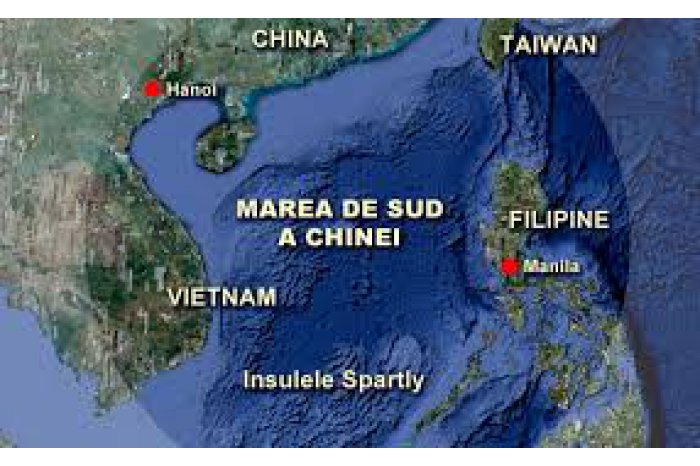
Beijing comments situation in South China Sea
Chisinau, 24 May /MOLDPRES/- According to a press release by the Chinese Embassy in Chisinau, the Chinese News China weekly newspaper and The National Interest magazine from the USA on the last days published an article written by the current vice minister of the Foreign Ministry of the People's Republic of China, Fu Ying, and President of the Institute for South China Sea Studies Wu Shicun. The article reminds important events from the evolution of the situation in South China Sea, which provide references for those willing to know the essence of the problem.
Under the article, in the past years, the South China Sea problem has become the most important topic for the Chinese-American relations, which even led to military frictions between the two countries.
Historical record shows that, before the 30s of the last century, there was no controversy concerning the sovereignty of China over the Nansha Archipelago at the international level. The divergences appeared during the Japanese aggressive war and new order after the war. In late 1950s, Philippines, Vietnam and other states started to occupy islands and reefs from Nansha Archipelago. In 70s and 80s of the last century, following the discovering of oil and gas resources in South China Sea and starting of negotiations on exclusive economic zone system, the se occupations entered a frenzy phase.
The situation in the South China Sea started being strained in 2009, especially in 2012. The Chinese-American military frictions in this zone became more frequent. In 2009, at least five incidents between American and Chinese military ships occurred during the reconnaissance and counter-reconnaissance missions. The restraint policy applied by the Chinese government is facing double pressures, triggered by continuity of policies and people’s will. The incident on the Huangyan island from April 2012 forced the Chinese government to adopt a string of countermeasures.
On 22 January 2013, Philippines submitted an application for arbitration on China to the Court for the Law of the Sea with the United Nations. The Foreign Ministry of China released more declarations, according to which the essential content of the arbitration process is focused on which country has sovereignty over some islands and reefs from South China Sea, and such a problem exceeds the applicability of the UN Convention on the Law of the Sea. The countries signatories to the Convention, such as China, have the right to release a declaration on rejecting binding arbitration in setting out the sea border line. Therefore, China does not recognize the arbitration process and does not participate in it.
To cope with the change of the situation in the Nanshan Archipelago, to improve the living conditions of residents on the islands of the archipelago and to meet the needs of military defence, China started infrastructural construction on islands and reefs under its control in late 2013. Yet, the actions have been strongly accused by the USA and Philippines.
The change in the American policy on South China Sea led to the strengthening of China's firm decision to defend its own legitimate interests.
If the relevant sides opt for cooperation, they will get common benefits. If they choose antagonism, the situation will get in into a deadlock, or even conflicts will take place, which will harm the interests of all parties, the article also reads.
(Editor M. Jantovan)
BTA: Trips by Bulgarian Residents Abroad Up 5.8%, Non-Residents' Visits to Bulgaria Up 2.9% Y/Y in November
BTA: Bulgarian Naval Research Ship Arrives at Bulgarian Antarctic Base on Livingston Island
BTA: New Construction Chamber Chair Kachamakov Pledges Fight Against Shadow Economy, Focus on Workforce and Youth Engagement
BTA: First Bulgarian Geodesist to Set Foot on Antarctica Worked on Research Laboratory at Bulgaria’s Livingston Island Base
BTA: Aleksandar Nikolov and Karlos Nasar Make Top Ten of Balkan Athlete of 2025 Poll
BTA: Cultural Values – National Pride Book Maps Out New Approach to Protecting Bulgaria’s UNESCO Heritage
BTA: Continue the Change - Democratic Bulgaria: New Cabinet with This Parliament Is Highly Undesirable
BTA: National Social Security Institute Unanimously Approves 2026 State Social Security Budget
BTA: Scope Ratings Agency Confirms Bulgaria's "A-" Credit Rating, Outlook Stable
BTA: Kiril Valchev Unanimously Re-elected BTA Director General
BTA: Romanian PM Paying Two-Day Visit to Austria, Scheduled to Meet Hungarian Counterpart
BTA: Poll Identifies Shift in Bucharest Mayoral Race, One Candidate Withdraws
BTA: Bulgarian Women’s Team Win World Title in Aesthetic Group Gymnastics in Samokov
BTA: Bulgaria to Host Opening, First Three Stages of Giro d'Italia Cycling Race in May 2026
Conflicts in Middle East: Foreign Ministry has not received requests for assistance from citizens of the Republic of Moldova
Over 2,300 digital medical certificates issued on very first day after launch
VIDEO // Republic of Moldova marks four years since submitting application for European Union membership
Over 95% of newborns in Moldova tested free of charge for hearing loss detection
PHOTO // Stories of sacrifice: files on fallen heroes of Dniester War preserved at Ștefan cel Mare Academy of Ministry of Internal Affairs
Moldovan president participates in national scientific conference on culture of memory
VIDEO // Discover Moldova with #MOLDPRES: cultural tourism, art of eggs' decorating in authentic experience at Aievea – handicraft house in Ciniseuti
Moldovan-Romanian bilateral cooperation strengthened through new diplomatic mandate: Ambassador of Moldova presented copies of accreditation letters in Bucharest
PM meets Head of Norwegian Embassy's Office in Chisinau
Moldovan deputy PM for reintegration participates in events of commemoration for heroes dead at Transnistria War
Moldova’s agricultural sector grows: total output up by almost 14 per cent in 2025
Road, railway, logistics projects discussed with delegation of Greece in Chisinau
IMF confirms reliability of National Bank of Moldova, effectiveness of its monetary policies
PHOTO GALLERY // Day of Remembrance and Gratitude through the lens of MOLDPRES: tribute to heroes who died for Moldova's Independence
Parliament speaker warns people who defy authorities of Moldova may lose citizenship
Moldovan PM says peace fragile, all share responsibility to protect it

